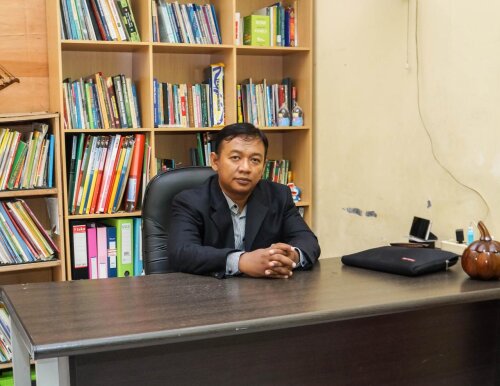Best Divorce & Separation Lawyers in Indonesia
Share your needs with us, get contacted by law firms.
Free. Takes 2 min.
Free Guide to Hiring a Family Lawyer
Or refine your search by selecting a city:
List of the best lawyers in Indonesia
About Divorce & Separation Law in Indonesia
Divorce and separation in Indonesia involve legal procedures that dissolve or nullify a marriage contract between two individuals. Governed primarily by Law No. 1 of 1974 concerning Marriage and further regulated by the Islamic Law Compilation, Indonesian divorce law can vary depending on religious and civil contexts. Generally, divorce is permissible when pursued legally through Indonesian courts and is recognized once a court issues a decision. Divorces among Muslim couples are overseen by religious courts, while civil courts handle cases for non-Muslims.
Why You May Need a Lawyer
Legal representation can be crucial in ensuring a smooth divorce process in Indonesia for various reasons. Firstly, divorce proceedings can be complex due to differing interpretations of religious and civil law. Legal counsel can help navigate these intricacies. Secondly, issues related to asset division, child custody, and support can often lead to disputes. A lawyer can provide guidance and representation to protect your interests. Lastly, if one party is uncooperative or if there are allegations of abuse, legal intervention can be necessary to ensure a fair and safe process.
Local Laws Overview
Indonesia's laws regarding divorce and separation are multi-layered:
- Marriage Law No. 1 of 1974: This law establishes the legal foundations for marriage, including potential grounds for divorce such as adultery, gambling, imprisonment, abandonment, or irreconcilable differences.
- Religious Context: For Muslims, divorces are conducted in religious courts following the Islamic Law Compilation. For others, civil courts handle proceedings under civil law jurisdiction.
- Child Custody and Support: Custody is generally determined based on the child's best interests, with younger children often staying with their mothers. Financial support responsibilities are typically outlined during divorce proceedings.
- Asset Division: Assets acquired during the marriage are usually divided equally, but prenuptial agreements and contributions from both parties can influence this division.
Frequently Asked Questions
What are the basic grounds for divorce in Indonesia?
Grounds for divorce can include adultery, chronic gambling, imprisonment of a spouse, abandonment, or irreconcilable differences.
Do I need to go to court for a divorce?
Yes, divorces in Indonesia must be processed through the courts to be legally recognized, whether in religious or civil courts.
Can prenuptial agreements affect divorce proceedings?
Yes, prenuptial agreements can impact asset distribution and liability settlements during divorce proceedings.
How are child custody and support decided?
Courts decide child custody based on the child's best interests, often favoring the mother for young children. Financial support is also determined during the proceedings.
Is it possible to get divorced without my spouse's consent?
Yes, unilateral divorce is possible if you can prove the existence of valid grounds for divorce.
What is the role of mediation in divorce?
Mediation can be used to facilitate amicable settlements on contentious issues like asset division or child custody before proceeding to court.
Are there differences in divorce proceedings for Muslims and non-Muslims?
Yes, Muslims follow Islamic law and process their divorce in religious courts, while non-Muslims use civil courts.
How long does a typical divorce process take?
The time frame can vary widely based on complexity, but a simple divorce might take a few months, while complex ones can extend much longer.
Can foreigners file for divorce in Indonesia?
Yes, foreigners can file for divorce in Indonesia if they meet certain residency requirements and follow local laws.
What happens to joint marital property upon divorce?
Joint marital property is typically divided equally, though this can be subject to prenuptial agreements or negotiation outcomes.
Additional Resources
For further information and guidance, you may wish to contact the following:
- Indonesian Legal Aid Foundation (YLBHI): Offers legal assistance and resources.
- Religious Courts: For Muslims seeking divorce, contact local religious courts for guidance.
- Indonesian National Commission on Violence Against Women: Offers support for cases involving domestic violence during divorce.
- Local Bar Associations: Can provide referrals to practicing family law attorneys.
Next Steps
If you require legal assistance with divorce and separation in Indonesia, consider the following steps:
- Contact a qualified family law attorney who is familiar with both religious and civil legal proceedings.
- Gather all necessary documents, including marriage certificates, financial records, and any prenuptial agreements.
- Explore mediation possibilities to amicably resolve any contentious issues before proceeding to court.
- Engage with support organizations for legal and emotional support through the process.
- Schedule consultations with local legal aid services if financial resources are limited.
Lawzana helps you find the best lawyers and law firms in Indonesia through a curated and pre-screened list of qualified legal professionals. Our platform offers rankings and detailed profiles of attorneys and law firms, allowing you to compare based on practice areas, including Divorce & Separation, experience, and client feedback.
Each profile includes a description of the firm's areas of practice, client reviews, team members and partners, year of establishment, spoken languages, office locations, contact information, social media presence, and any published articles or resources. Most firms on our platform speak English and are experienced in both local and international legal matters.
Get a quote from top-rated law firms in Indonesia — quickly, securely, and without unnecessary hassle.
Disclaimer:
The information provided on this page is for general informational purposes only and does not constitute legal advice. While we strive to ensure the accuracy and relevance of the content, legal information may change over time, and interpretations of the law can vary. You should always consult with a qualified legal professional for advice specific to your situation.
We disclaim all liability for actions taken or not taken based on the content of this page. If you believe any information is incorrect or outdated, please contact us, and we will review and update it where appropriate.
Browse divorce & separation law firms by city in Indonesia
Refine your search by selecting a city.

















